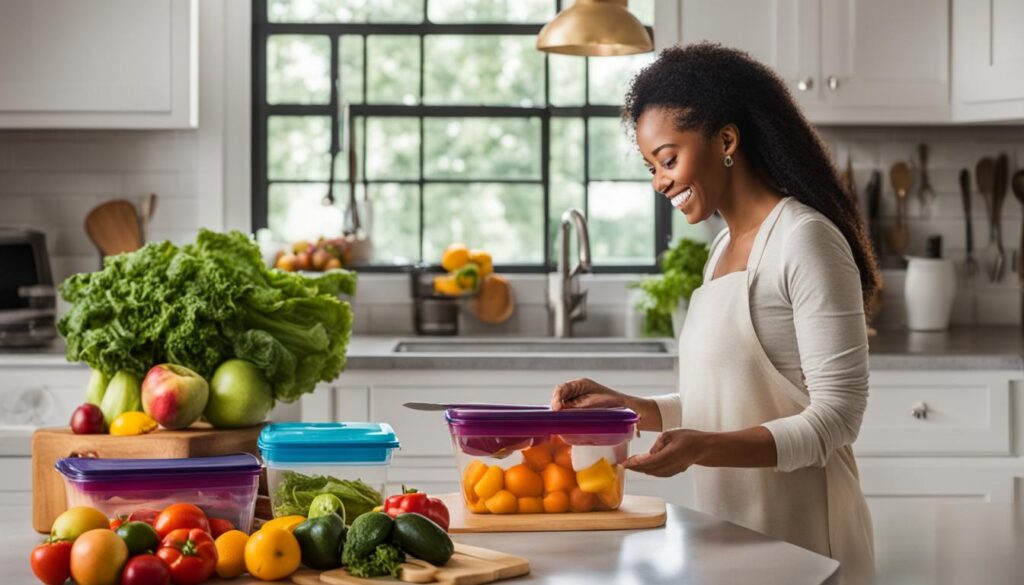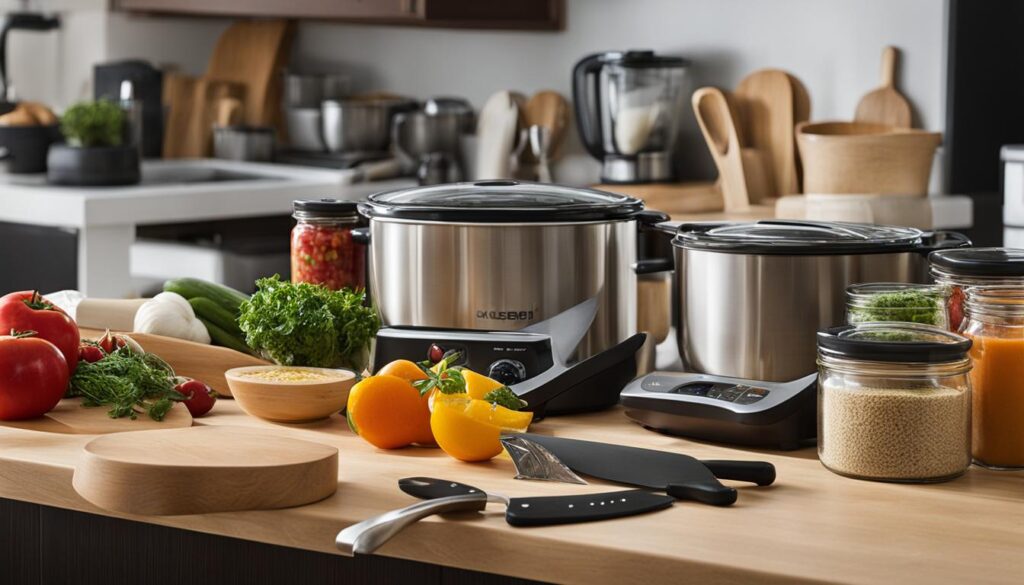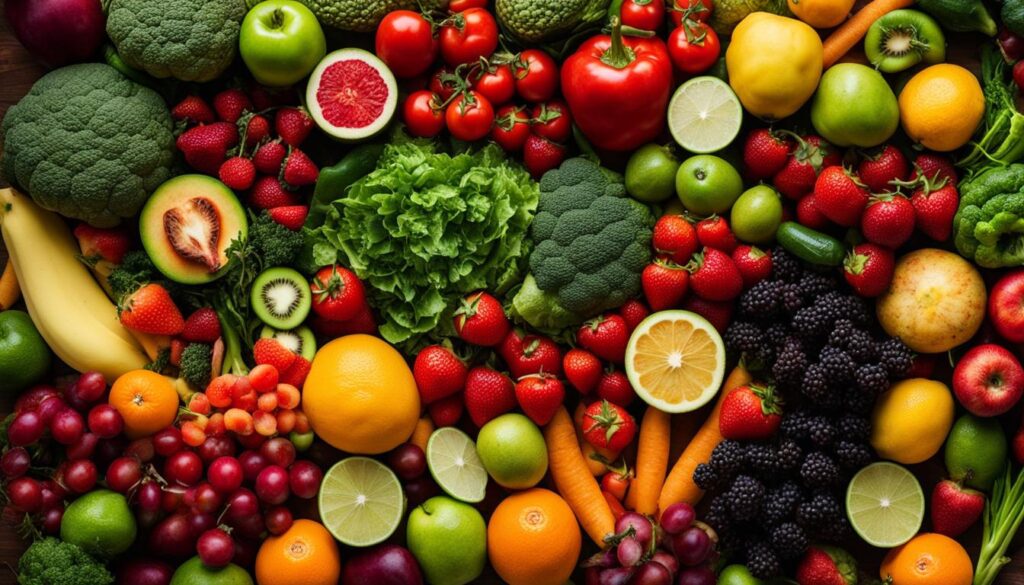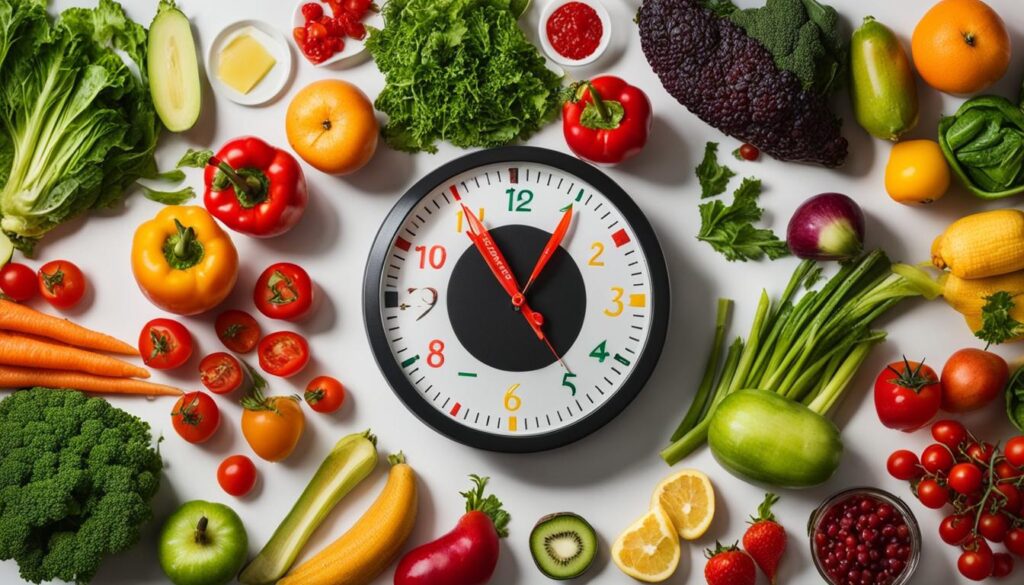Meal prep is a game-changing approach that allows you to conquer the week with nutritious and delicious meals ready at your fingertips. It saves time, promotes consistent nutrition, supports portion control, reduces food waste, and helps with stress reduction. This article will provide practical tips and recipes for a week of healthy eating through meal prep.
Key Takeaways:
- Meal prep is a time-saving method for maintaining a healthy eating routine.
- Consistent nutrition is achieved by planning balanced meals in advance.
- Portion control and reducing food waste are additional benefits of meal prepping.
- Meal prep can help reduce stress and improve your overall well-being.
- This article will provide practical tips and recipes for beginners to get started with meal prep.
The Benefits of Meal Prepping
Meal prepping is a game-changer when it comes to managing your meals and achieving a healthy lifestyle. By taking a little time to plan and prepare your meals in advance, you can enjoy a multitude of benefits that make a big difference in your overall well-being.
Time Efficiency
One of the biggest advantages of meal prepping is the time you save. By dedicating a few hours each week to preparing your meals, you can reclaim valuable time during busy weekdays. No more scrambling to figure out what to cook for dinner or stressing about last-minute grocery store runs. With meal prepping, your meals are ready and waiting for you, allowing you to focus on other priorities.
Consistent Nutrition
When you meal prep, you have full control over what goes into your meals. This means you can ensure that every meal is balanced and meets your nutritional needs. By planning and prepping your meals in advance, you can incorporate a variety of nutrient-dense foods, ensuring consistent, well-rounded nutrition for your body.
Portion Control
Meal prepping helps you practice portion control, which is essential for maintaining a healthy weight and managing your overall health. By portioning out your meals in advance, you avoid overeating and consuming more calories than needed. Each meal is thoughtfully prepared and sized appropriately, making it easier to stick to your dietary goals.
Cost Savings
Contrary to popular belief, meal prepping can actually save you money. By buying ingredients in bulk and planning your meals in advance, you can avoid impulsive and costly food purchases. Additionally, meal prepping reduces food waste since you only buy what you need and use everything you prepare. This can result in significant cost savings over time.
Reduced Food Waste
Meal prepping not only saves you money, but it also helps reduce food waste. By planning your meals and utilizing leftovers, you can utilize ingredients more efficiently and minimize food waste. This not only benefits your wallet but also contributes to a more sustainable approach to eating.
Stress Reduction
With busy schedules and demanding lifestyles, meal prepping can be a lifesaver when it comes to reducing stress. No more frantic meal prep during the week or last-minute decisions about what to eat. By having your meals ready in advance, you eliminate the stress of meal planning and preparation, allowing you to enjoy more free time and a calmer mindset.
Improved Food Choices
Meal prepping encourages healthier food choices. When you have your meals planned and prepared in advance, you are less likely to give in to the temptation of unhealthy convenience foods. Instead, you have nutritious and satisfying meals readily available, making it easier to stick to your dietary goals and make conscious decisions about your food intake.
Enhanced Variety
Meal prepping also allows for greater creativity and variety in your diet. With a little planning, you can experiment with new recipes, ingredients, and flavors. By incorporating a diverse range of foods, you ensure that your meals are not only nutritious but also exciting and enjoyable. Say goodbye to boring, repetitive meals and hello to a world of culinary exploration!
Energy Conservation
Finally, meal prepping helps conserve your energy for other activities. Instead of spending time and effort on meal planning and preparation throughout the week, you can channel your energy into pursuits that matter to you. Whether it’s spending quality time with loved ones, focusing on your career, or engaging in hobbies, meal prepping frees up valuable time and energy for what truly brings you joy.
Meal prepping truly offers a multitude of benefits that go beyond just a well-balanced diet. It saves you time, ensures consistent nutrition, supports portion control, saves money, reduces food waste, alleviates stress, improves food choices, provides variety, and conserves your energy. Embrace the power of meal prepping and unlock a more convenient and healthier way of eating!
How to Get Started with Meal Prep
If you’re ready to take control of your nutrition and enjoy the convenience of healthy meals throughout the week, getting started with meal prep is the way to go. By understanding your nutritional needs, setting realistic goals, and anticipating potential roadblocks, you can set yourself up for success. Here’s how to get started:
1. Understanding Your Nutritional Needs
Before you begin meal prepping, it’s important to have a clear understanding of your nutritional needs. Consider factors like your age, gender, activity level, and any specific dietary requirements or restrictions you may have. Consulting with a registered dietitian or nutritionist can help you determine the right calorie and macronutrient intake for your goals.
2. Setting Realistic Goals
Setting realistic goals is an essential part of the meal prep journey. Whether you’re looking to lose weight, build muscle, or simply maintain a healthy diet, it’s important to be realistic about your expectations and progress. Start small and gradually increase the complexity of your meal prep as you become more comfortable with the process.
3. Anticipating Roadblocks
Meal prep is all about staying one step ahead, so take the time to anticipate any roadblocks that may hinder your progress. Consider factors like time constraints, lack of motivation, or culinary skills, and come up with strategies to overcome these obstacles. For example, you can set aside dedicated meal prep days, involve family members or roommates in the process, or try out meal prep delivery services for added convenience.
4. Selecting Healthy Food Options
The foundation of successful meal prep lies in selecting healthy food options. Opt for whole foods that are rich in nutrients and avoid processed and refined ingredients as much as possible. Locally sourced, organic produce and sustainably raised meats can add an extra level of freshness and quality to your meals.
5. Creating Balanced Meals
Creating balanced meals is crucial to ensure that you’re meeting your nutritional needs. Aim to include a variety of nutrient-dense foods in each meal, such as lean proteins, complex carbohydrates, and healthy fats. Don’t forget to add a rainbow of colorful fruits and vegetables to boost your intake of vitamins, minerals, and antioxidants.
6. Prepping for Success
Prepping for success involves having the right tools and essentials in your kitchen. Invest in quality meal prep containers that are microwave and dishwasher safe, as well as tools like sharp knives, cutting boards, and kitchen scales. Understanding proper storage and reheating techniques will help maintain the freshness and flavor of your prepared meals.

With these steps in mind, you’re ready to embark on your meal prep journey. Remember to start small, stay consistent, and enjoy the benefits of having nutritious meals at your fingertips. Whether you’re a beginner or an experienced meal prepper, there’s always room to learn and improve.
Tips and Tricks for Meal Planning
Meal planning is an essential tool for achieving a healthy and convenient eating routine. To help you master the art of meal planning, here are some valuable tips and tricks to make the process easier and more effective:
Meal Planning on a Budget
Planning meals on a budget doesn’t mean compromising on nutrition or taste. With a little strategic thinking, you can create delicious and affordable meals. Here’s how:
- Buy whole foods: Opt for whole foods like fruits, vegetables, whole grains, and legumes, as they tend to be more budget-friendly than processed foods.
- Plan around affordable ingredients: Look for deals and discounts on staple ingredients and plan your meals around them. This will help you save money while enjoying a variety of flavors.
- Take advantage of sales and discounts: Keep an eye out for sales and discounts at your local grocery store or farmers’ market. Stock up on ingredients that are on sale and use them in your meal planning.
Incorporating Variety and Flavor
One common challenge with meal planning is the potential for monotony. To keep your meals exciting and enjoyable, follow these tips:
- Try different recipes, cuisines, and spices: Experiment with new recipes, explore different cuisines, and incorporate a variety of spices and herbs to add flavor and excitement to your meals.
- Get creative with ingredients: Use seasonal produce and experiment with different combinations to create unique and flavorful dishes.
- Embrace leftovers: Repurpose leftovers into new meals by adding fresh ingredients and spices. This not only adds variety but also helps reduce food waste.
Meal Planning for Special Diets
If you have dietary restrictions or follow a special diet, meal planning requires a bit of extra attention. Here’s how to make it work:
- Research and creativity: Spend time researching recipes, resources, and substitutions that cater to your specific dietary needs. With a little creativity, you can create delicious meals that meet your requirements.
- Seek inspiration from specialty cookbooks and websites: There are many cookbooks and websites dedicated to special diets. They offer a wealth of ideas and recipes tailored to specific dietary needs.
Maximizing Time and Effort
To make the most of your meal planning process and save time and effort, consider implementing these strategies:
- Set aside dedicated meal planning time: Designate a specific time each week to plan your meals. Treat it as a priority and make it a habit to ensure consistency.
- Prep ingredients in advance: Chop vegetables, cook grains, and marinate proteins ahead of time. This will significantly reduce the time and effort required when preparing meals during the week.
- Get the whole family involved: Enlist the help of family members or roommates in meal planning and preparation. Divide tasks and enjoy the process together.
By implementing these tips and tricks, you can streamline your meal planning process and enjoy delicious, nutritious meals throughout the week.
Kitchen Essentials and Meal Prep Tools
When it comes to successful meal prep, having the right kitchen essentials and meal prep tools is essential. These tools not only make the process more efficient but also help ensure that your meals stay fresh and delicious throughout the week.
To kickstart your meal prep journey, invest in quality kitchen essentials such as:
- Sharp knives for effortless chopping and slicing
- Sturdy cutting boards to protect your countertops
- Durable cookware for even cooking and easy cleaning
With the right tools at your disposal, you’ll find meal prep a breeze.
But what about storing your prepped meals? This is where meal prep containers play a vital role. Opt for high-quality containers that are:
- Airtight to keep your food fresh and prevent leakage
- Divided into compartments to separate different components of your meal
- Microwave and freezer-safe for versatile usage
Investing in meal prep containers that meet these criteria will help keep your meals organized and prevent them from becoming soggy or unappetizing.
One of the key strategies in meal prep is batch cooking. By preparing multiple meals at once, you can save time and ensure you always have a healthy option on hand. After batch cooking, it’s important to transfer your meals into individual portions and freeze them for later use.
Here’s a table illustrating the benefits of batch cooking and freezing meals:
| Benefits of Batch Cooking and Freezing Meals |
|---|
| 1. Time-saving – Cook once, enjoy multiple meals |
| 2. Ensures convenience – Always have a healthy meal ready to go |
| 3. Prevents food waste – Use up ingredients before they spoil |
| 4. Cost-effective – Buying ingredients in bulk saves money |
Proper storage and reheating techniques are crucial for maintaining the quality and safety of your meals. When storing your prepped meals, follow these tips:
- Allow your food to cool completely before transferring it into meal prep containers.
- Label your containers with the date to keep track of freshness.
- Store your meals in the refrigerator or freezer depending on the shelf life.
When reheating your meals, be sure to:
- Use microwave-safe containers if reheating in the microwave.
- Thaw frozen meals in the refrigerator overnight before reheating.
- Heat thoroughly to ensure food safety.
By following these storage and reheating techniques, you’ll enjoy delicious and safe meals every time.
Now that you understand the importance of kitchen essentials, meal prep containers, batch cooking, freezing meals, and proper storing and reheating techniques, you’re well-equipped to embark on your meal prep journey and enjoy the convenience of having healthy meals ready to go.
Next, I’ll share some valuable tips and tricks for meal planning, helping you optimize your meal prep process and get the most out of your healthy eating goals.

Meal Planning on a Budget
Eating healthy on a budget is not only possible but can also be an exciting challenge. With some careful planning and strategic choices, you can create delicious, nutritious meals while saving money. Here are some tips to help you master the art of meal planning on a budget.
| Strategies | Benefits |
|---|---|
| Choosing whole foods | • Provides essential nutrients • Supports overall health |
| Planning meals around affordable ingredients | • Maximizes value for money • Expands culinary creativity |
| Taking advantage of sales and discounts | • Saves money on groceries • Allows for stocking up on pantry essentials |
| Buying in bulk | • Reduces cost per unit • Provides long-term savings |
| Repurposing leftovers | • Minimizes food waste • Adds versatility to meals |
“Planning meals around affordable ingredients and incorporating sales and discounts into your shopping routine can be the first step in eating healthy on a budget. Choosing whole foods is key to getting the most nutrition for your money.”
By opting for whole foods, such as fruits, vegetables, whole grains, and legumes, you can nourish your body while keeping costs down. Plan your meals around these ingredients, allowing you to make the most of what’s available and affordable. You’ll be amazed at the variety of flavorful and nutritious meals you can create even on a tight budget.
“Buying in bulk can significantly reduce the cost of staple ingredients, like rice, pasta, beans, and spices. So, take advantage of bulk bins at your local grocery store or consider joining a wholesale club like Costco or Sam’s Club.”
Another smart strategy is to be on the lookout for sales and discounts. Check out weekly flyers or download mobile apps from your favorite grocery stores to stay updated on the latest deals. Planning your meals around these discounted items can result in significant savings while still enjoying a wide range of nutritious options.
“Don’t underestimate the power of repurposing leftovers! Turn yesterday’s roasted chicken into today’s flavorful chicken salad or transform leftover veggies into a delicious stir-fry. Let your creativity flow, and you’ll be amazed at how repurposing can give new life to leftovers.”
Lastly, repurposing leftovers not only saves money but also adds variety to your meals. Transforming yesterday’s dinner into a whole new dish prevents food from going to waste and creates exciting culinary experiences without breaking the bank.
With a little bit of planning, creativity, and strategic choices, meal planning on a budget can become a fulfilling and rewarding practice. By prioritizing whole foods, utilizing discounts, buying in bulk, and repurposing leftovers, you’ll be able to nourish yourself and your family while saving money.
Incorporating Variety and Flavor in Meal Planning
When it comes to meal planning, keeping things interesting and flavorful is essential. Incorporating a variety of ingredients, recipes, cuisines, and spices can make your meals more exciting and enjoyable.
Trying different recipes is a great way to break out of your routine and explore new flavors. Whether it’s experimenting with a new dish or putting a twist on an old favorite, trying different recipes adds a sense of adventure to your meal planning.
“Cooking is like love. It should be entered into with abandon or not at all.”
– Harriet Van Horne
Exploring different cuisines can also expand your culinary horizons. From Mexican to Thai, Indian to Italian, each cuisine brings its own unique flavors and techniques. By incorporating a diverse range of cuisines into your meal planning, you can transport your taste buds around the world without leaving your kitchen.
Spices are another fantastic way to add flavor and depth to your meals. Whether it’s a sprinkle of cinnamon in your oatmeal or a dash of cayenne in your stir-fry, experimenting with different spices can take your dishes to the next level. Don’t be afraid to get creative and try new combinations!
As a visual representation, here is a table showcasing various cuisines and spices you can incorporate into your meal planning:
| Cuisine | Spices/Flavors |
|---|---|
| Mexican | Cumin, chili powder, paprika, cilantro, lime |
| Thai | Curry paste, lemongrass, ginger, coconut milk, fish sauce |
| Indian | Turmeric, cumin, coriander, garam masala, cardamom |
| Italian | Garlic, basil, oregano, rosemary, balsamic vinegar |
| Middle Eastern | Cumin, coriander, turmeric, cinnamon, sumac |
Remember, the key to incorporating variety and flavor in meal planning is to step out of your comfort zone and try new things. Don’t be afraid to mix and match ingredients, experiment with different recipes, and explore the world of cuisines and spices. Your taste buds will thank you!

Meal Planning for Special Diets
When it comes to meal planning, catering to special diets requires some adjustments and substitutions to ensure that every meal fits your dietary preferences and requirements. Whether you follow a vegetarian, vegan, gluten-free, or low-carb diet, meal planning can be adapted to suit your needs.
Researching recipes and resources that cater to specific dietary needs is an essential first step. There is an abundance of online platforms, cookbooks, and blogs that offer a wealth of ideas and inspiration for meal planning for special diets. These resources can provide you with a variety of delicious and nutritious options that align with your dietary restrictions.
When meal planning for a vegetarian diet, incorporating a diverse range of plant-based proteins such as legumes, tofu, tempeh, and seitan can ensure you’re meeting your nutritional needs. Adding plenty of fresh fruits, vegetables, whole grains, and healthy fats will complete your meals.
Vegan meal planning takes it a step further by eliminating all animal products. It’s important to ensure you’re getting enough protein from plant-based sources, such as beans, lentils, quinoa, and nuts. Including fortified foods or supplements to meet your vitamin B12 and iron requirements is also crucial.
Gluten-free meal planning involves excluding gluten-containing grains like wheat, barley, and rye. Opt for naturally gluten-free grains such as rice, quinoa, buckwheat, and corn. Additionally, many gluten-free alternatives to traditional wheat-based products are available, including bread, pasta, and flour.
For those following a low-carb diet, meal planning should focus on foods that are low in carbohydrates but high in protein and healthy fats. Incorporate nutrient-dense vegetables, seafood, eggs, poultry, and unsaturated fats like avocado, nuts, and olive oil. Limiting starchy vegetables, grains, and sugary foods helps to keep your carbohydrate intake in check.
Adapting meal plans for special diets often requires adjustments and substitutions. Don’t be afraid to get creative and experiment with different ingredients. For example, you can replace meat with plant-based protein alternatives, swap regular pasta with gluten-free options, or use cauliflower rice as a low-carb substitute for traditional rice.
Remember to always consult with a healthcare professional or registered dietitian to ensure you’re meeting your nutritional needs when following a special diet. They can provide personalized guidance and assistance in creating a meal plan tailored to your specific dietary requirements.
Special Diets and Meal Planning
| Diet | Key Points |
|---|---|
| Vegetarian | Incorporate plant-based proteins, fruits, vegetables, whole grains, and healthy fats. |
| Vegan | Eliminate all animal products and focus on plant-based proteins, fortified foods, and supplements. |
| Gluten-free | Avoid gluten-containing grains and opt for gluten-free alternatives and naturally gluten-free options. |
| Low-carb | Choose foods low in carbohydrates but high in protein and healthy fats, and limit starchy vegetables and grains. |
Maximizing Time and Effort in Meal Planning
When it comes to meal planning, maximizing time and effort is essential for creating a seamless and efficient experience. By implementing a few key strategies, you can streamline the process and ensure that your meal prep is as productive as possible.
Dedicating Meal Prep Time
One of the most effective ways to maximize your time in meal planning is by dedicating specific blocks of time for meal prep. Designating a set time each week solely for meal planning allows you to focus solely on this task without distractions.
During your dedicated meal prep time, gather all the necessary ingredients, plan your meals for the week, and prepare any components you can in advance. This focused approach will help you work efficiently and minimize interruptions, saving you valuable time throughout the week.
Using Meal Planning Tools
Meal planning tools can be a game-changer in optimizing your meal prep process. There are various online and mobile apps available that provide tools and templates for meal planning, including customizable meal calendars, grocery lists, and recipe databases.
These tools can simplify the planning process, help you stay organized, and even suggest recipes based on your dietary preferences and ingredient availability. Embracing technology can enhance your meal planning endeavors and make them more efficient.
Prepping Ingredients in Advance
Prepping ingredients in advance is a crucial step in maximizing your time during the week. Take some time during your meal prep session to chop vegetables, marinate proteins, and pre-cook grains or legumes.
By prepping ingredients in advance, you can significantly reduce the amount of time and effort required to put together your meals during busy weekdays. It also allows for more flexibility in the kitchen, as you can easily mix and match pre-prepped ingredients to create a variety of dishes.
Involving Family Members or Roommates
Meal planning doesn’t have to be a solitary task. Involving family members or roommates can not only lighten the workload but also make it a fun and collaborative experience.
Assigning specific tasks to each person involved, such as chopping vegetables or assembling meal containers, allows everyone to contribute to the meal prep process. It also encourages cooperation and shared responsibility in maintaining a healthy eating routine.
Optimizing your time and effort in meal planning is all about being organized, utilizing helpful tools, and involving others. By implementing these strategies, you can ensure that your meal prep is efficient, enjoyable, and sets you up for a successful week of healthy eating.

Conclusion
Meal prep offers a multitude of benefits that can transform your approach to healthy eating. By investing a little time and planning in advance, you’ll reap the rewards throughout the week. Let’s summarize the advantages of meal prepping:
- Time savings: Meal prep saves time during busy weekdays, enabling you to focus on other priorities.
- Consistent nutrition: Planning your meals in advance ensures that you’re getting balanced and nourishing options consistently.
- Portion control: With pre-portioned meals, you can stay on track with your portion sizes and weight management goals.
- Cost savings: By buying ingredients in bulk and avoiding impulse purchases, you can reduce your grocery bill.
- Reduced food waste: Meal prep helps minimize food waste by using ingredients efficiently and preventing unused portions.
- Stress reduction: Having meals ready and waiting eliminates the stress and decision-making of what to eat.
- Improved food choices: When you have pre-planned meals, you’re less likely to reach for unhealthy convenience options.
- Enhanced variety: Meal prepping allows you to experiment with different ingredients, flavors, and cuisines.
- Energy conservation: By preparing meals in advance, you conserve energy during busy weekdays.
Meal planning is essential for long-term success in maintaining a healthy lifestyle. Start incorporating meal prep into your routine and experience the convenience, health, and satisfaction it brings. Embrace the benefits of meal prepping and enjoy delicious, nutritious meals without the stress.
Get Started with the Meal Plan Mastery Course
If you’re ready to take your meal planning skills to the next level, look no further than the Meal Plan Mastery course. This comprehensive course offers a step-by-step guide to simplify your weekly meal planning process. Whether you’re a beginner or have some experience in meal prep, this course is designed to help you create healthy and delicious meals with ease.
With the Meal Plan Mastery course, you’ll gain access to valuable tools and support that will enhance your meal planning experience. From meal prep templates and recipe organizers to shopping lists and kitchen essentials checklist, you’ll have everything you need to stay organized and make the most out of your meal prep sessions.
Enrolling in the Meal Plan Mastery course gives you the opportunity to learn from expert instructors who are passionate about healthy eating and meal planning. They will provide guidance, practical tips, and inspiration to help you overcome any obstacles you may face along the way. Plus, you’ll join a community of like-minded individuals who are on the same journey as you, providing additional support and motivation.
Don’t miss out on this valuable opportunity to master the art of meal planning. Enroll in the Meal Plan Mastery course today and take control of your health and well-being with delicious, nutritious meals that are ready to enjoy!
FAQ
What are the benefits of meal prepping?
Meal prepping offers advantages such as time efficiency, consistent nutrition, portion control, cost savings, reduced food waste, stress reduction, improved food choices, enhanced variety, and energy conservation.
How do I get started with meal prep?
To get started with meal prep, understand your nutritional needs and goals, set realistic goals, anticipate potential roadblocks, select healthy food options, create balanced meals, and prep for success.
What are some tips and tricks for meal planning?
Some tips and tricks for meal planning include meal planning on a budget, incorporating variety and flavor, meal prep for special diets, and maximizing time and effort.
What are the kitchen essentials and meal prep tools I need?
Kitchen essentials for meal prep include knives, cutting boards, and cookware. Meal prep tools include meal prep containers, dividers and compartments, and proper storage and reheating techniques.
How can I do meal planning on a budget?
Meal planning on a budget can be achieved by choosing whole foods, planning meals around affordable ingredients, taking advantage of sales and discounts, buying in bulk, and repurposing leftovers.
How can I incorporate variety and flavor into meal planning?
Incorporate variety and flavor in meal planning by trying different recipes, cuisines, and spices to add excitement and enjoyment to your meals.
How can I do meal planning for special diets?
Meal planning for special diets involves researching recipes and resources that cater to your specific dietary needs, making adjustments and substitutions as needed.
How can I maximize time and effort in meal planning?
Maximize time and effort in meal planning by setting aside specific time for meal prep, utilizing meal planning tools, prepping ingredients in advance, and involving family members or roommates.
What is the importance of meal planning?
Meal planning is important for saving time, promoting consistent nutrition, supporting portion control, reducing food waste, and making healthier food choices. It allows for creativity, variety in your diet, and conserves energy for other activities.
How can I get started with the Meal Plan Mastery course?
To get started with the Meal Plan Mastery course, enroll for a step-by-step guide to simplify weekly meal planning. The course provides tools, inspiration, and support to help you succeed in meal prep.

